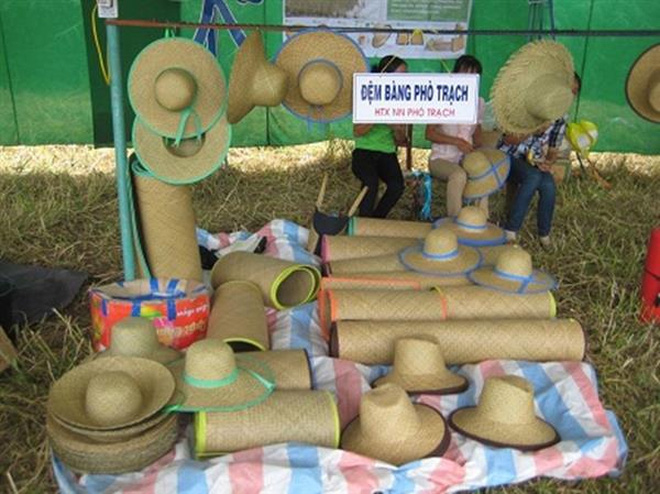Eco-friendly products get tax cuts on export
 photo cafeF |
Outlined by the Ministry of Finance, under Circular No.128/2016/TT-BTC on export tariff exemption for environmentally-friendly products, incentives are set to come into effect on September 23, 2016.
Under the new regulations, goods that have achieved compliance with standards set out under Vietnam’s green label programme will be eligible for a complete exemption from all export taxation.
Vietnam has recently released an optional environmental certification for enterprises, to emphasise its commitment to environmental protection, and as a means of incentivising investors to comply with a more stringent set of standards.
In addition to exemptions offered to goods with Vietnam’s green label, goods relating to recycling activities and waste treatment and disposal will also be eligible for 50 per cent reduction on applicable export tariffs.
A list of goods eligible for reductions is outlined in the government’s Decree No.19/2015 ND-CP, detailing a number of articles of the Law on Environmental Protection issued in 2014.
The key areas include treatment of concentrated domestic wastewater, collection, transport, and treatment of solid waste, treatment of hazardous waste, treatment and renovation of polluted areas; rescue and handling of oil spills, chemical incidents, and other environmental incidents, and the production and export of environmentally-friendly products.
Vietnam currently applies export tariffs on a variety of products used in the extractive industry, and other exports that are deemed to have a significant impact on Vietnam’s environment. Depending on the impact that a given industry or export is deemed to have, taxes can range from 0-45 per cent.
Commenting on these new incentives, Asia Briefing Ltd., a subsidiary of legal, tax, and operational advisory firm Dezan Shira & Associates, stated that “For investors currently considering use of the green label certification or working in industries related to waste treatment and recycling, the introduction of incentives could provide a significant boost to operations.”
Nguyen The Dung, deputy director of locally-owned Green Solutions Co. Ltd, said his firm sees the new incentives in Circular 128 as “a golden opportunity to boost exportation of products made from recycled plastics”.
“We are planning to co-operate with a Japanese firm to establish a joint venture in Vietnam to produce and exports these products to ASEAN markets,” Dung said. “Currently, an average high export tax rate of 8-15 per cent is imposed on our products. If this rate is removed, we will be able to increase our profit by about 10 per cent annually.”
Like Dung’s firm, South Korea-based Kanden Renewable Energy Company is also optimistic about Circular 128.
“We will come to Vietnam in October to work with the local authorities about a possibility of building a lighting equipment facility with recycled materials used. We will export the products,” said Kanden Renewable Energy Company’s director Choi Sung Guk. “However, under Circular 128, products eligible for a complete exemption from all export taxation must meet standards of Vietnam’s green label programme. But we wonder that if our products can meet South Korea’s green standards, whether that means they can satisfy the programme’s standards or not.”
According to Asia Briefing Ltd., the programme conforms with the International Standards Organisation and is administered at the national level by the Ministry of Natural Resources and Environment. To obtain green label certification, specific procedures and protocols must be followed dependent on the good in question.
The structure of the application process is broadly outlined in Circular No.41/2013/TT-BTNMT on ecobiotic labelling for environmentally-friendly products, which took effect on January 15, 2014.
What the stars mean:
★ Poor ★ ★ Promising ★★★ Good ★★★★ Very good ★★★★★ Exceptional
Latest News
More News
- Hermes joins Long Thanh cargo terminal development (February 04, 2026 | 15:59)
- SCG enhances production and distribution in Vietnam (February 04, 2026 | 08:00)
- UNIVACCO strengthens Asia expansion with Vietnam facility (February 03, 2026 | 08:00)
- Cai Mep Ha Port project wins approval with $1.95bn investment (February 02, 2026 | 16:17)
- Repositioning Vietnam in Asia’s manufacturing race (February 02, 2026 | 16:00)
- Manufacturing growth remains solid in early 2026 (February 02, 2026 | 15:28)
- Navigating venture capital trends across the continent (February 02, 2026 | 14:00)
- Motivations to achieve high growth (February 02, 2026 | 11:00)
- Capacity and regulations among British areas of expertise in IFCs (February 02, 2026 | 09:09)
- Transition underway in German investment across Vietnam (February 02, 2026 | 08:00)
















 Mobile Version
Mobile Version